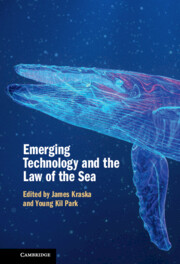Book contents
- Emerging Technology and the Law of the Sea
- Emerging Technology and the Law of the Sea
- Copyright page
- Contents
- Contributors
- Preface
- 1 Emerging Technology and Maritime Boundary Dispute Resolution
- 2 Renewable Energy and the Law of the Sea
- 3 Striking an Equitable Balance under the Biodiversity Agreement
- 4 Small Modular Reactors and Transportable Nuclear Power Plants
- 5 Shipping, Distributed Ledgers and Private Maritime Law
- 6 Maritime Cyber Security
- 7 International Standards for Hull Inspection and Maintenance of Robotics and Autonomous Systems
- 8 Functionalism and Maritime Autonomous Surface Ships
- 9 Artificial Intelligence to Facilitate Safe Navigation of Ships
- 10 Unmanned and Autonomous Warships and Military Aircraft
- 11 Seabed Technology and Naval Operations on the Continental Shelf
- Index
3 - Striking an Equitable Balance under the Biodiversity Agreement
The Elusive Case of New Technologies, Marine Genetic Resources and the Global South
Published online by Cambridge University Press: 07 July 2022
- Emerging Technology and the Law of the Sea
- Emerging Technology and the Law of the Sea
- Copyright page
- Contents
- Contributors
- Preface
- 1 Emerging Technology and Maritime Boundary Dispute Resolution
- 2 Renewable Energy and the Law of the Sea
- 3 Striking an Equitable Balance under the Biodiversity Agreement
- 4 Small Modular Reactors and Transportable Nuclear Power Plants
- 5 Shipping, Distributed Ledgers and Private Maritime Law
- 6 Maritime Cyber Security
- 7 International Standards for Hull Inspection and Maintenance of Robotics and Autonomous Systems
- 8 Functionalism and Maritime Autonomous Surface Ships
- 9 Artificial Intelligence to Facilitate Safe Navigation of Ships
- 10 Unmanned and Autonomous Warships and Military Aircraft
- 11 Seabed Technology and Naval Operations on the Continental Shelf
- Index
Summary
Marine bioprospecting is the examination of marine genetic material of plants, animals and microorganisms for features that may be of value for commercial purposes. These features may include chemical compounds, genes and their products, or, in some cases, the physical properties of the material in question. One of the principal attributes of bioprospection is the commercialization of the research or the intellectual property derived from the research on marine genetic resources (MGRs). This chapter explores the key challenges for an international treaty under UNCLOS governing access and use of MGRs in areas beyond national jurisdiction, including the deposit of material in biorepositories and mechanisms for sharing of knowledge from research on MGRs, such as a clearing house, and legal requirements for sharing data including gene sequence data and greater participation of researchers from developing countries. Reference is made to the International Treaty on Plant Genetic Resources and the 2010 Nagoya Protocol.
Keywords
- Type
- Chapter
- Information
- Emerging Technology and the Law of the Sea , pp. 63 - 107Publisher: Cambridge University PressPrint publication year: 2022

